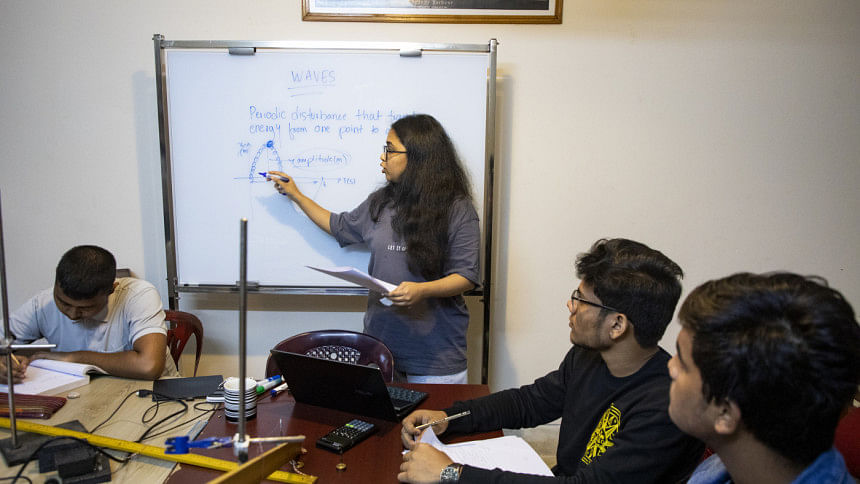The unintended long-term effects of coaching culture

Most students in Bangladesh have attended coaching classes at some point in their academic life. While many of us may have felt the necessity of some external aid to keep up with our schoolwork or to prepare for admissions and public exams, joining coaching classes is rarely of the student's own volition. The normalisation of attending regular coaching classes tends to push many parents into thinking that it's a necessity rather than an option students may or may not need to utilise.
While attending coaching classes may be beneficial for many, long-term reliance on them may lead to several adverse effects in the future.
In urban areas, the coaching onboarding can start from as young as kindergarten, where many parents sign their children up for classes specifically targeting admission tests for reputable schools. This is especially prevalent among National Curriculum and Textbook Board (NCTB) students, who join coaching for board exams. In fact, sometimes due to the insistence of school teachers and sometimes due to parents hoping to push their children towards better academic results, attending a couple of coaching classes is practically an inseparable culture in the national curriculum.
Recounting my own experience, coaching did me more harm than good. For the Primary School Certificate (PSC) exams, my parents enrolled me into a renowned academic care centre, which took up a large portion of my days that could have, otherwise, been spent on self-study. I was also discouraged from forming positive habits in favour of adopting those that could land me a better grade in board exams. Some of these include not solving maths by myself and strictly following methods in the book or by school teachers, and memorising essays from textbooks or guidebooks rather than writing them on my own. My parents said that examiners may be teachers from any part of the country, so any unfamiliar method or vocabulary may result in penalisation of scores, as their reason behind this discouragement. Refusing to stick to all these suggestions caused me to get low marks in model tests, and my parents were also informed and instructed to make sure I memorise the notes instructors at the coaching centres handed out instead.
Coaching classes can be successful at delivering what they promised – good results in board exams. However, they serve to be a bit of an impediment in the long run, especially considering the Higher Mathematics portions in secondary and higher secondary levels require decent problem-solving abilities from the students themselves, and memorising the math problems won't suffice.
Aside from the weakened problem-solving abilities due to having most solutions written out and spoon-fed to us, we also end up forming our study habits around these additional coaching classes.
Natasha Hasan, a third-year Electrical and Electronic Engineering student at Islamic University of Technology (IUT), shares how she exclusively relied on coaching classes as a roadmap for her studies, "I've always been a procrastinator, and I put off my work until the last possible minute. Since coaching classes would generally be way ahead of my classes in school, I had all the necessary topics covered before the exams rolled around. Now that I no longer have such coaching classes to keep me in check, I struggle to keep up with my lectures, leading to bad grades."
Fariha Shams Ahmed, a Computer Science and Engineering student at BRAC University, echoes a similar opinion, "Students brought up in a coaching-centric structure are overfed with tons of information, and have to relearn how to study without being in that structure, since universities tend to make you do some research while self-studying. The transition in researching and not having information spoon-fed to us can be a bit of a jump."
Fariha also mentions what she views as an upside of attending coaching classes, saying, "The habit you form while taking on that extra burden of attending coachings can help you on your grind in university, but I'm genuinely not fond of how it takes up a student's day, which could have been spent on learning a new skill, personal development, or hobbies. Coaching classes are like slapping a bandaid on as a solution to academic difficulties that encourage you to simply study more, rather than engage in critical thinking."
The general consensus among students is that coachings served to provide a sort of structure that abated their stalling habits. Whether these coaching classes were actually able to help make grasping concepts easier for them is an ambiguous matter that elicits mixed responses from students.
While it may be easy to write off coaching classes as unnecessary and harmful, it's quite true that in schools, with large numbers of students in one classroom, there's not a lot of time allocated for students to bring forth individual complaints. That being said, it's also necessary to establish whether a student really needs to attend coaching classes before enrolling in them. Otherwise, it may prove difficult to overcome the bad habits formed during this phase.

 For all latest news, follow The Daily Star's Google News channel.
For all latest news, follow The Daily Star's Google News channel. 



Comments